#pilgrimage scheme
Explore tagged Tumblr posts
Text
तीर्थयात्रा योजना में अल्पसंख्यकों के साथ भेदभाव
महाराष्ट्र में तीर्थ यात्रा योजना की घोषणा के साथ, राज्य सरकार ने वरिष्ठ नागरिकों को सरकार द्वारा सूचीबद्ध 139 स्थानों में से एक तीर्थ स्थल पर जाने का अवसर प्रदान किया है। जिसमें अल्पसंख्यकों के साथ भेदभाव का आरोप .. (Discrimination against minorities in Maharashtra pilgrimage scheme) इस्माईल शेखमुंबई- सामाजिक कार्यकर्ताओं ने मुख्यमंत्री तीर्थ दर्शन योजना के तहत तीर्थ स्थलों की यात्रा के लिए…
#Ajmer Dargah#ajmer sharif#Breaking news#Chennai news#CM eknath Shinde#Discrimination against minorities#Hindi news#Indian Fasttrack News#Latest News#Maharashtra government#Maharashtra GR Download#Maharashtra News#Maharashtra pilgrimage scheme#Maharashtra Politics#maharashtra tirth yatra yojana#minorities#Mukhyamantri Tirth Darshan Yojana#Mukhyamantri Tirth Darshan Yojana PDF#Mumbai#Mumbai News#pilgrimage scheme#political news#Rajasthan news#tamilnadu news#Tirth Darshan Yojana PDF#velankanni church#velankanni church chennai#velankanni feast 2024#velankanni mother marry#अल्पसंख्यक
0 notes
Text
#Kailash Mansarovar Yatra#UP government scheme#Kailash Yatra subsidy#UP Yatra funding#Mansarovar pilgrimage grant#Rs 1 lakh yatra aid#UP pilgrimage support#Kailash Yatra 2025#UP Mansarovar assistance
1 note
·
View note
Text
🧿 Spiritual Tourism in India 2025: How Pilgrimage is Powering the Economy
In 2025, spiritual tourism in India has emerged as a top contributor to domestic travel and rural development. From Varanasi and Ayodhya to Kedarnath and Bodh Gaya, millions are travelling not just for prayer — but for peace, purpose, and personal transformation. With enhanced infrastructure, digital bookings, and safety systems, India’s ancient pilgrimage sites are booming like never before. 🚆…
#AI in temples India#Ayodhya Ram Mandir tourism#Char Dham Yatra 2025#Incredible India religious travel#Kashi Vishwanath corridor visitors#live darshan apps#pilgrimage destinations India#PRASHAD scheme India#spiritual tourism in India 2025#spiritual wellness India#temple tourism India growth#Tirupati e-darshan#UNESCO spiritual tourism India#Vaishno Devi updates#yoga retreats 2025
0 notes
Text
65 Muslim Pilgrims Depart for Ajmer Sharif-Fatehpur Sikri-Agra
Under the Chief Minister’s Pilgrimage Scheme, 65 Muslim pilgrims from East Singhbhum set off for a seven-day pilgrimage to Ajmer Sharif, Fatehpur Sikri, and Agra. A 65-member group of Muslim pilgrims, including attendants, from East Singhbhum district departed for Ajmer Sharif, Fatehpur Sikri, and Agra under the Jharkhand government’s Chief Minister’s Pilgrimage Scheme. JAMSHEDPUR – Under the…
#Agra#Ajmer Sharif#Avinesh Tripathi#जनजीवन#Chief Minister&039;s Pilgrimage Scheme#East Singhbhum#Fatehpur Sikri#Jamshedpur News#Jharkhand government#Life#Muslim pilgrims#pilgrimage arrangements#Priyanka Tiru
0 notes
Text

Chief Minister's Pilgrimage Scheme: A Step Towards Promoting Religious Tourism in Punjab
0 notes
Text
I present to you: The Whitegull River Symphony.
A classical symphony in four movements, inspired by @thesiltverses! The most recent episode swept me away in a river of creative inspiration, and I couldn't help but follow this stream to whatever murky depths it wanted to take me.
Creative thoughts and details beneath the cut.
The Whitegull River Symphony is written in f-Minor for a full symphonic orchestra. My rendition was created in FLStudio, using Spitfire's BBC-Symphonic-Orchestra plugin, as I am just one mediocre violinist without an entire orchestra at hand.
First Movement: River Angels, Allegro Assai
The first movement is dominated by the steady rhythm of the celli and violae, who act as the slow waves of our murky river. Among these waves, the faithful have prepared a sacrifice. Their hopeful prayers flick aross the water in the first half of the movement, and are answered by the scutteling, chittering spawn of the river in the second half.
Second Movement: Pilgrimage of the Prophet, Adagio
In the second movement, we focus entirely on our favorite little prophet (whose brilliant performance inspired me to make this. The existence of this symphony is your fault, @sassylich). He marches on through the silt with slow steps, while the clarinet plays his theme. His little schemes behind the scenes are played by the string section, the obvious warning signs are announced by the horns. Nevertheless: In the end, everyone is playing his tune.
Third Movement: The Withermark, Andante
And here we go, the river's might is unleashed. The angels of the river god approach unstoppably, drawn here by the prophet: His clarinet is setting the tune for the overwhelming wrath of the trawlerman. Nothing can stand in its way, but after the tides have calmed, new life can grow in their wake.
Fourth Movement: Katabasis, Allegro Assai
Katabasis, the descent into the depths. Nothing escapes the greedy maw of the Trawlerman, nobody can float above, untouched. All the instruments we've hear so far return, desceding into the roiling depths of the bassline. This is not a comforting or hopeful ending, this is an apocalypse.
#the silt verses#the trawlerman#whitegull river#brother faulkner#richard faulkner#the silt verses fanart#tsv#tsv fanart#sister carpenter#mine
536 notes
·
View notes
Note
*posing cutely, sticking one owl leg in the air*
What are your ideas for how the Gods are worshipped in GGG?
Oh man I could’ve never seen this question coming woah. Anyway [cracks knuckles
Generally - Paintings, statues, etc. The gods of the grove seem to have a lot of art involved in the way people like worship and look up to them.
Mitternacht - This is god prime. We think she gets a lot of sea shanties and sailor chants since she looks over the cove. Generally though we don’t think she has a very specific form of worship? She’s the sort of “everything works” member of the pantheon since her role is sorta just. God.
Inspekta - The Bizzyboys! Join the Bizzyboys! Or at least help em out. Also enjoys offerings and directly helping people find out where they need to be led in life. Sadly many of these practices fizzled out with Inspekta’s mental spiral and subsequent self isolation. I imagine he used to be an extremely accessible and easy to visit god before then.
Cobigail - She’s got some of my strongest or most set in stone thoughts, which is! It’s basically witchcraft! Sigils, charms, rituals done with certain foods or drinks. I have a really strong “Cobigail is a witch that ascended” headcanon that sorta bleeds into all the stuff I write for her teehee. Yay!
Thespius - Revelry baby!!! He’s the god of love AND mirth! Being happy and having fun in his name is great! Drinking with friends, doing silly improv, dancing around to music. That’s all Thespius worship baby! Love doesn’t have to be romantic after all, love your friends and love your life ;] More direct worship may include sending him music, writing, etc specifically made for him
Click Clack - I think writers and storytellers will often try to invoke him for luck with their work. Little mask charms on typewriters, notebooks, and computers. Even braver worshippers might even send their works in progress straight to Click in the hopes he’ll give them the time of day. I hear sending it in with the gift of coffee beans makes it more likely :)
Bauhauzzo - Worship of Bauhauzzo is very closely tied with visiting him, listening to stories and telling him some of your own, even if he already knows it. Other forms include working in libraries, helping in museums, doing your best to preserve things such as old family relics and all. He’s the god of knowledge, preserving as much as you can in his name sounds like worship to me!
Huzzle Mug - MAKE WEIRD ART! GO! MAKE IT NOW! Also buzzhuzz speak. The buzzhuzz dialect of nonsense words is basically a form of everyday worship, whether it came before or after Huzzle mug doesn’t really matter anymore in the grand scheme of things because it’s definitely a mimicry of how Huzzle talks in the modern day. Aside from that though? It’s making weird art, pushing the limits, changing things up. Try a new clothing style, switch up your pronouns, shave your head bald, whagever! That’s change, baby!
King - We see the least of King so I’m working my brain real hard on this one. I think King gets a lot of like. Travelers. Writing letters and praying to King that they’ll arrive safely or even delivering the letter yourself. Pilgrimages to other parts of the grove or even earth or the drain. Sorta trying to mimic all the help King offered people. And after she ascends she probably sets up an entire like post office or delivery group or whatever. There’s a bizzyboys 2 joke here somewhere. Anyway go become a delivery person for King 👍
Thank u for asking! This is a post I’ll probably come back to and edit in the future but for now this works
49 notes
·
View notes
Text
15 Day BL Challenge (part 4)
59. What's a hill you're willing to die on when it comes to BL?
Omg, yes, someone asked me!!!!!
I will die on this hill, fite me.
*ahem*
Cupid’s Last Wish is a good series!
I know there is a shit ton of hate for this series and I have absolutely no idea why. It is a masterclass in physical acting, seriously, it is phenomenal! The story is very basic, because the focus of the series is the character’s journey and self discovery. Korn and Win already knows they’re in love, the story begins with them already knowing that they love one another, they just haven’t acted on those feelings nor have they admitted their feelings to one another. But never once does the narrative act like we the viewers are supposed to wonder if they love one another, that’s not the point of the plot. It’s how miscommunication and grief can blind someone so much that they lose themselves within those feelings.

In the case of the series, Win literally loses himself thanks to his anger. He nearly kills his body and damns his sister’s soul, so he must go on a pilgrimage with Korn to heal his own soul whilst his body is wavering between life and death which could very well take his sister’s soul with it. Korn, his best friend of 22 years and soulmate is the only person who can see him whilst trapped in his sister Lin’s body, because Korn always sees Win for who he really is. And of course we have the conniving mother, a well meaning family friend and a mysterious monk.
This is some of Mix’s best acting, not just as Win since Mix doesn’t usually play such a toxic character. But because for most of the runtime he is playing a male character trapped inside a female’s body, trying to trick everyone expect for three people that he is in fact a woman. Jan is fantastic in the role as well, because when she’s onscreen she must act as if she is a male stuck in an woman’s body with a male’s mind, trying to convince people she’s a woman.
It’s a complete mind fuck! Mix and Jan are fantastic as Win, the way they carry themselves, walk the same, stand the same, take up the same space, speak the same way. But don’t think Earth has it easy in this series either, because he had to make sure he held, touched and spoke to Mix and Jan exactly the same way. So when they edited the scenes to overlap, seeing Jan’s body instead of Mix’s, Earth is in the exact same position with both of them.


Seriously, if you dropped this series, try it again. Watch it just for the acting, because it’s phenomenal.
Also it has what might be the best onscreen reaction to menstruation from a male’s point of view without it being misogynistic, gross or rude. They make some jokes, like Korn not knowing what kind of pads to get for Win when he starts his period, and of course how Win feels having to care for and clean his sister’s body in a respectful manner. How he experiences her emotions, her hormonal shift, the pain of cramps, the way his whole body aches and how sick he feels. Korn is also so caring, trying to help Win through something he’d never experienced before without crossing a line with Lin’s body because whilst it’s Win, his best friend and love of his life, and when he looks at Lin he sees Win in his mind, it is still Lin’s body physically there. And as much as he loved Win, wanted Win, Lin was a baby sister to him and he could not, would not, touch Lin’s body in a sexual manner.

At the end of the series when he admits to Win and Lin’s mother that ‘something happened’ between him and Lin (it was Win, but in Lin’s body) all he meant was that Win had kissed him. Yes, he had kissed Win, shared a bed with Win, but he knew how that looked to people who didn’t know it was Win in Lin’s body. So to keep Lin from being shamed he agreed to marry her, instead of trying to explain to their mother that the assumption she was making about Korn taking Lin’s virginity was wrong.
There are fantastic villain characters in the form of the scheming aunt and uncle. Not to mention the family secret, Win and Lin’s mother facing her homophobia concerning her son, Lin being in love with someone else and of course Korn being forced into a mess that he did not want to be a part of but considering he had been friends with Win for 22 years and loved him more than life, how could he say no?
It’s a beautiful story, it’s funny, well acted and has Mix working with animals!

#blchallenge2k24#cupid’s last wish#cupid’s last wish the series#kornwin#earthmix#earth pirapat#mix sahaphap#jan ployshompoo#yes it’s based around a family’s dairy farm which some viewers might have issue with#but I’m a vegan and watched it just fine#although I mean…#I dont eat meat for medical reasons and I’m lactose intolerant#so I legit have no horse in this race lol
80 notes
·
View notes
Text
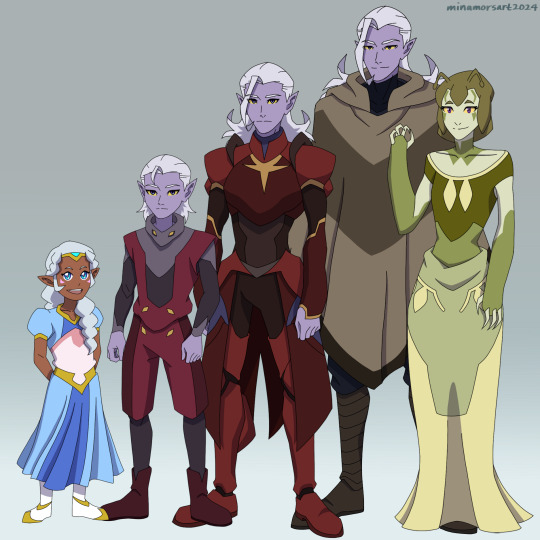
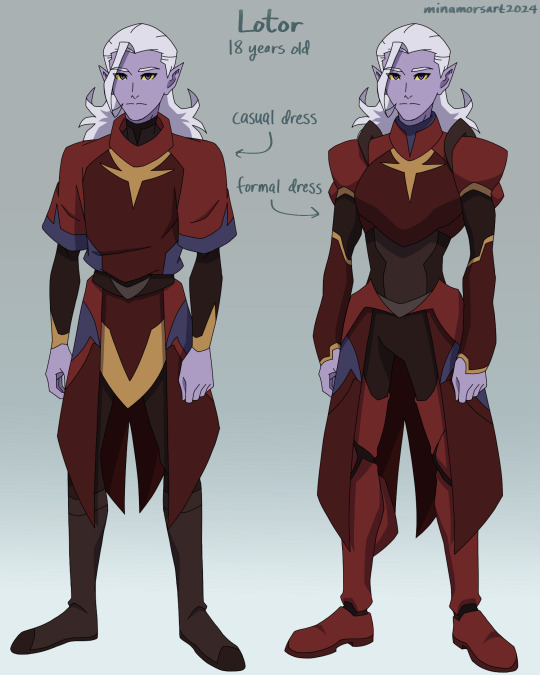

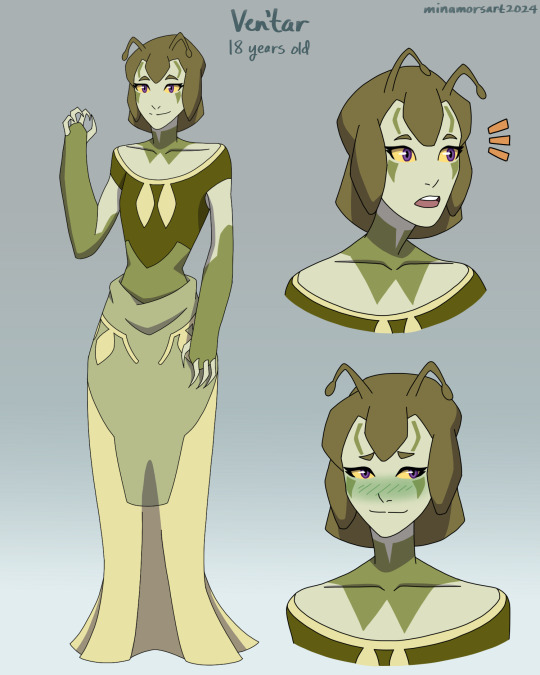


🌌✨The Empyreal Within character designs of Lotor, Allura, and Ven'tar! I might do Honerva and Zarkon next, we'll see! This is part of an upcoming project that I am super excited about and will reveal in time!!! 💜
Explanations of the outfits below! I thought about them a LOT hehe.
18 year old Lotor: these designs I am the most pleased with! Lotor's official design in the show is very different from the rest of the Galra, which I believe is significant to him venturing further away from the precedents established by his father and cementing his own individuality. However, as an adolescent it makes sense that he would still wear Galra attire, hence the bulky armor (to make him look bigger since he is smaller than the average Galra) and red and gold colors which appear to only be worn by the royal family. I like to think that the insignia on his chest is a symbol for royalty, but is also exclusive to Lotor's identity, as no one else wears that particular insignia in the show. And despite wearing clothes specifically chosen to represent the Galra Empire, I can also picture him wanting to incorporate his own personal tastes, so there are accents of purplish-blue (as blue is part of Lotor's color scheme) and the addition of his waist cape, both of which represent his growing desire for change and independence.
Mid-20's Lotor: this is during the many years of his banishment. I imagine him hopping from planet to planet, concealing his identity as much as possible while adopting a more humble lifestyle and pursuing his passion for exploring. It is during this isolated pilgrimage that he does a lot of introspection, self-actualization, and gains self-confidence both as a man and as the Galra prince. But before that happens, the lack of identity really shows in his clothes -- lots of neutral colors (with a hint of desaturated blue), absence of any insignias or designs that would connect him to any culture, whether Galra or Altean. These clothes in particular were inspired by Jedi ponchos and Sasuke from Naruto: The Last, and perhaps are worn while Lotor is on a desert planet for a short time! And just like with his armor as seen in the show, he has started to wear gloves to cover himself up almost completely, indicating his avoidance of vulnerability and getting close to others.
Ven'tar: for her fortunately I didn't have to change much about her character design! She is Lotor's age when they meet and the only other change I made to her was to take away her big cape so that she appears younger. Since her planet and species name is not revealed in the show, I want to come up with one myself. Caelifera is the scientific name for grasshopper, so I'm thinking I could do something with that!
11 year old Lotor: this design is also taken directly from the show, so I didn't have to do much there :P The cloak he wears in the little doodle is inspired by the one adult Lotor wears in S6E4. In this case, however, it is several sizes too big for young Lotor and drags on the ground.
Allura: sadly we don't know much about Allura's life on Altea, however in S1E9 we get to see tiny snippets of different stages throughout her life and her good relationship with her father, so I used those as references! I gave her braids, short puffy sleeves, and a slightly shorter skirt to give her that innocent little princess look, and then used the colors from her dress in the show to create a cuter and more childlike aesthetic!
If you read all of that you're the best 😆🙏 I'm definitely by no means an expert in character design and have lots more to learn, but I had a lot of fun coming up with the original designs! Especially Lotor's, but no surprise there hehe. I studied many different Galra armor and clothing featured in the show worn by Lotor, Zarkon, Honerva, and Galra commanders. More than anything I just really wanted to see Lotor wearing something different for a change 😂 and then everything else took off from there!
#the empyreal within#dawn of empyreal#minamorsart#lotura#lotor#allura#ven'tar#voltron#voltron legendary defender#vld#voltron art#vld art#my art#fan art#digital art#non star wars art
124 notes
·
View notes
Text
‘From the 1530s on, there was a sense of a new world of possibilities. The mood had been encouraged by Henry's greatest minister, Thomas Cromwell, who had set bright young men to producing blueprints for the future in a number of areas: finance, law reform, building prosperity in farming and industry. Not many of these schemes came to anything, but the excitement remained, and there was a continuing link with the universities, particularly Cambridge. In the middle of most of Cromwell's projects was the word 'commonwealth'. Characteristically and repeatedly, the projectors had seen what they were doing in terms of the whole community's good. The evangelical dimension was provided by the fundamental Reformation critique of works theology: the medieval church had allowed ritual works to divert and waste people's instinct to do good. As Archbishop Cranmer put it in his 1548 visitation articles: people should 'that bestow upon the poor chest, which they were wont to bestow upon pardons, pilgrimages, trentals, masses satisfactory, decking of images, offering of candles, giving to friars, and other like blind devotions'. The social activism of the Cromwellian reformers represented the same refocusing of energy. The programme of projects and proposals for change and innovation in all areas of society continued after Cromwell's fall'.
- MacCulloch, Tudor Church Militant
16 notes
·
View notes
Text
bundletober #8: nasty, brutish, and long
welcome to bundletober, the txttletale dot tumblr dot com ttrpg blogging indulgence that absolutely everyone. is talking about? yes! today i read a slightly longer game than most of the ones i've been talking about here, because, frankly, it captivated me. nasty brutish, and long, by not writing, is a game about rebellion.
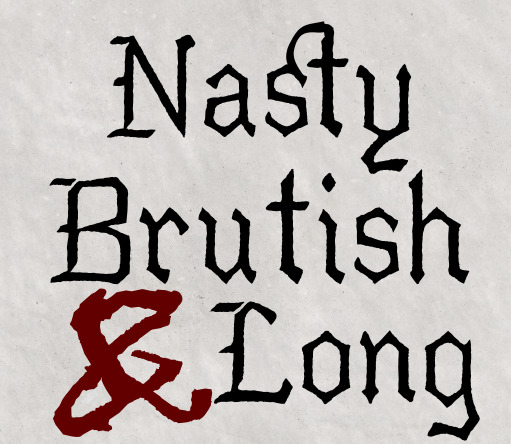
what instantly drew me into this game is that 'rebellion' isn't abstract and it doesn't happen for no reason. a lot of games like to style themselvs as being 'about rebellion' or 'about revolution', with no actual desire to engage in why revolutions happen--there's an evil empire and you're fighting it because it's evil. but nasty, brutish, and long is clearly deeply invested in questions of class and economics--part of the first session asks you to consider the economic state of the nation:

and yet another part gives you a 36-item table to roll on for an inciting incident for the revolution in question:
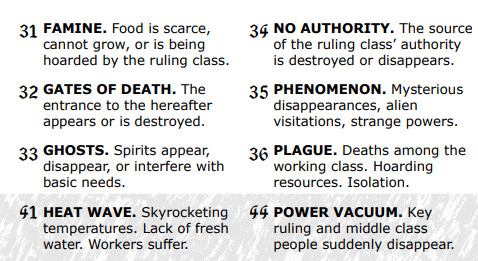
i love this shit--well, firstly, because i love games that give you strong plot hooks, games that tell you about their world, games that imply possibilities through options rather than grabbing your lapels and telling you what possibilities are on the table in tedious monologue. but second because this shows that the game wants to tell stories about the realities of revolution, that it is founding itself in history as more than just an aesthetic.
another really cool thing that happens before you even get out of character creation is 'backgrounds' -- as part of creating your character, you select four backgrounds (professions your character has worked), which are separated by social class (another choice you make at character creation). while you can always choose, the game encourages you to roll on yet more tables and make a story from that--i've done it a few times, and it's great fun.
for example, in the course of writing this post i created geoffrey--born a rural peasant class, he was taken in under the wing of a preacher after his family died. the preacher recognizes his potential and groomed him to be his successor--when the preacher eventually passed away, geoffrey, who'd always been a confident silvertongued lad, became his rural township's pastor. however, although he was convincing, he'd never been a true believer--so while when on a pilgrimage a merchant approached him with a simple scheme, using the legal immunity afforded to pilgrims to have him smuggle contraband into the country, he happily became a smuggler. this worked out great for a while, and saw geoffrey make a very tidy sum--but after a particularly close call he realized that he needed to get the hell out of this arrangement. with the sum of his ill-gotten gains, he travelled to a city and purchased a bookstore, becoming a middle class shop owner. he happily lived out the next few decades selling books--but at heart, he missed the fire of a sermon, having the ear of a crowd, so in his late years he passed his shop on to his son and became an elderly teacher, bringing literacy to the village of his youth.
this is exactly the kind of thing i fucking love about tabletop roleplaying games, the feeling that the game is chiming in with me as i try to tell a story, throwing me these weird curveballs i have to 'yes, and!' to create a backstory i'd never have thought of on a million years on my own. something else worth noting is that character creation is very open for a forged in the dark game -- you're unlkely to even have the same set of attributes as someone else, and you can pick backgrounds and abilities (mostly) totally independent of one another or any overarching playbook-type restriction.

the game itself diverges from blades in a lot of interesting ways. instead of blades' system of looking for the highest die, nasty, brutish, and long operates on a die pool system, which is what allows for it to add a large pile of levers for influencing rolls, including using multiple attributes for the same roll--there seems to be some OSR influence in here, with the open-endedness of the actual moment to moment gameplay and the vast amount of opportunities to use and exchange in-game resources. that said, unlike OSR stuff, there's a lot of effort being put in here to hand narrative control to players. instead of just saying 'you succeed' on a success, it says, 'the PC narrates what happens' which is a really cool spin on the usual success/mixed success/failure trifecta. players also get the ability to make up NPCs by expending resources, which is super cool.
other highlights include a take on burning wheel's drives system, a weird version of blades' resist mechanic that lets you change, rather than avert, the consequence your character faces, and a take on 'downtime' that frames it as more of a timeskip, during which years can pass. it's pretty cool stuff.
oh, and finally--the fucking style of this game is incredible. it does a lot with very little colour--a few splashes of dark red here and there is all it needs to complement its striking black and white, rich sense of texture, and
if there's one thing i don't like about nasty, brutish, and long, it's that it doesn't have any strong ideas about what the players need to be doing. the game establishes social turmoil and brewing revolution, makes a huge point of social class and class differences, but the verbs, the substance of what your player characters do, is deliberately left totally open. and that's cool for some people, some people like that openness a lot! but for me, who appreciates a tight and specific design, it doesn't do much. the tagline says its 'an game about class and revolution'--and i'm not sure i can fully agree with that. it'd be more accurate to call it a game 'containing class and revolution'. which is a step up from a lot of games that claim to be revolutionary, as i said before--but at the end of the day leaves me feeling like something's been left on the table.
still, there's a huge amount here worth checking out--even if you don't intend on playing it, it's a great look into the different directions you can take the forged in the dark framework, and a great tool for Making Up Guys. can't go wrong with making up a guy!
nasty, brutish, and long can be purchased as a digital download through itch.io
104 notes
·
View notes
Text
Mini Mac # 65 : Victory!
Uncles babysit tiny monkeys
Savage put her tiny hand on her chin. She was on her uncle Sanzang's palm, her brother was at her side. Her uncle was watching them for a few days while their dad's were out on their honeymoon, whatever that meant, Savage wasn't really sure what happened during honeymoons. She tried to ask but her dads skimmed around the question. She had been a bit upset at not being able to follow her dads (she was sure they were having fun!) but then she realized she would be able to spend time with her uncles, and she knew how easy it was to manipulate them. She was already scheming how she would convince them to let her (and her brother) have snacks before going to bed.
“You're planning something.” Mumbled Rumble as he scouted closer. Savage shushed him, she pushed her tiny fingers on her brother's mouth. Rumble huffed, unamused. “Relax, he didn't hear us.”
“You gotta be more careful, bro.” Replied Savage, she crossed her arms. She would not lose an opportunity to get extra snacks.
The pilgrims settled in a temple not far from Flower Fruit Mountain. Savage didn't remember a lot from the pilgrimage except having fun at others expense, but somehow Buddhist places always put her at ease, perhaps because it reminded her of her uncles. The smell of incense sticks and the mumbling of prayers soother her. Sanzang placed both tiny monkeys on the ground.
“No exploring.” He said sternly. Savage pouted, she would have to sneak out at night then.
“Or if you do, you have to bring one of your uncie with you.” Chuckled Ao Lie. Sanzang gasped, as if appalled by the idea.
“We all know forbidding exploring will not prevent them from exploring. They'll just sneak out.” Shrugged the dragon-horse.
“Especially the she-devil.” Huffed Bajie as he began to prepare dinner. Savage stuck her tongue at him, Bajie stuck his tongue out in response.
Eventually they settled for dinner. It was fun to catch up with her uncles. They had busy lives since the end of the pilgrimage. Some even founded a family of their own. When it was time to go to bed and Sanzang put both tiny monkeys in their tiny bed, Savage put on her most adorable expression and said :
“Can we have a snack?” Being adorable was an art in itself and Savage was very good at it. It took countless tries in her mirror to achieve the perfect degree of adorableness. Her brother, who was tucked at her side, snorted in disbelief. Savage kicked him under the sheet so he wouldn't mess up her plan.
“It doesn't sound very healthy.” Mumbled Sanzang.
“Dad always lets us have a snack before going to bed.” Lies. Her Pa might cave if she was being extra adorable but her Dad never fell for her cuteness. Rumble pulled the sheet on his lower face to hide his smile. His sister was clearly lying through her teeth and he found it amusing.
Sanzang looked at the two adorable tiny monkeys and sighed. He gave them a little bit of snacks.
Savage chirped happily.
Victory!
+ cut scenes
Savage *in front of her mirror* : I have to train my super, secret weapon! Being adorable.
Rumble *passing by* : mm, my sister is crazy but it's fun to watch
Ch1 / Previous / Next
10 notes
·
View notes
Text
With hundreds of highly prized species, bird tourism is thriving in the country – and farmers are increasingly turning their land into nature reserves
“Wildlife tourism is far more profitable than farming but that’s not the only reason we made the change,” says Ajila’s son, Luis Jr. “We wanted to save not just the umbrellabird, but all the special creatures here, and safeguard them for future generations.”
Projects such as this are eligible for funding from the Ecuadorian government. Launched in 2008, the Socio Bosque scheme offers “the poorest private and communal forest landowners annual payments for each hectare of forest cover maintained”, with sums of between $30 (£23) and $60 a hectare.

The Ajila family: Luis Jr, Alejandra and Luis Sr. Photograph: Dr Stephen Moss
But the income provided by birders alone has been enough to propel some farmers to take up the nature reserve model.A few years ago, Favián Luna decided to convert his 120-hectare tomato farm in the Tandayapa Valley, north-west of Quito, into a cloud-forest reserve and lodge called Alambi Reserve. Visitors go to photograph many species of hummingbirds, including the Andean emerald, native to the Chocó bioregion of the Ecuadorian Andes.
Nearby, at Mashpi Amagusa, former farmers Doris Villalbaand Sergio Basantes have created a reserve, lodge and garden, which attracts 260 species of sought-after birds. Highlights include glistening-green, flame-faced and beryl-spangled tanagers, and the rare, endemic rose-faced parrot.
At Finca La Victoriana in Pichincha, the owner Jacqui bought the house and land, and began to reforest the site while growing crops to feed herself. But during lockdown, when she was stuck in nearby Quito, all her crops were stolen. She was saved from having to sell up by a visiting friend, who heard an unusual sound from lower down the valley and realised this was one of South America’s most charismatic birds: the Andean cock-of-the-rock.

Male Andean cocks-of-the-rock (Rupicola peruvianus) lekking to attract a mate. Photograph: Jiri Hrebicek/Alamy
Since 2005, Ángel Paz and his younger brother Rodrigo have transformed their former dairy farm in Mindo into a bird reserve. At first, things didn’t go to plan: it took a month for the first visitor to arrive, and he paid just $10 for a four-hour tour. Since then, however, thousands of people have made the pilgrimage.
#solarpunk#solar punk#indigenous knowledge#solarpunk aesthetic#informal economy#farms#wildlife#bird sanctuary#bird reserve#ecuador#south america
19 notes
·
View notes
Text
Octopath Traveler Yuu and Dorm Leader Stories
by stories, i mean what has each of them go on their respective journeys. im replaying octopath traveler 2 again, and i figured i might as well get some sort of solid base for each of the twst traveler's stories xD
riddle's story would most likely be about him chasing down a criminal. as the hunter, he brings order to both the forest and the town. i'll probably have his starting town either be in the leaflands or toto'haha. the criminal could be disturbing the ecosystem wherever they go, and riddle will have none of that. it's the duty of a hunter to keep the ecosystem balanced, to take only what you need
leona's story will be about taking his kingdom back, like hikari. farena has been usurped by a scheming court official and cheka's whereabouts are unknown after the coup. his starting town will be in hinouema. he lost everything and became a thief, planning to one day take back his home
azul's story is about him expanding his business. he's a successful merchant, but on his journey, he'll learn what it means to be a true merchant. kinda going the opposite direction of partitio's story in which a successful merchant will see just how important it is to share and share alike. his starting town will probably be in the brightlands or harborlands
kalim's story is basically the same as agnea's only he's doing it undercover because he's the son of a very wealthy noble family that's comparable to the rondwell family and roque brilliante. his story will differ in the fact that people are looking to take him down both in the world of dancing and in the world of nobles by any means necessary. if azul's starting town is in the brightlands then kalim will be in the harborlands
vil's story will be about finding the source of a poison. he's a traveling apothecary who happened to stumble upon a case of mysterious poisonings. this story might change, but this is what i got for now. his starting town will most definitely be in the winterlands because snow white xD
idia's story will start when ortho forces him to go out and see the world. im not entirely sure what his journey will be though. maybe something like cyrus's story where he'll have to find a missing something. or maybe he gets caught up in something and now he has to go find the mastermind. if riddle is in toto'haha, then idia will be in the leaflands which is ironic because he has not touched grass lol
malleus's story will also be about him seeing the world. im also not too sure what he will do, but i think it would be like a journey to understand people and how to be a good ruler. his starting town will be in the wildlands
finally, yuu's story will probably be similar to temenos's or maybe it'll be more like ophilia's in that its a pilgrimage. maybe going around and teaching about the sacred flame? like a traveling cleric or something. she could encounter people from the moonshade order which would be the beginning of her journey. her starting town is, of course, in the crestlands
and the big question with probably the most obvious answer: who's the protagonist? it's yuu, of course. and the order in which she finds her fellow travelers will be the same order you encounter each dorm in twisted wonderland. so we start off with riddle, then leona, then azul, and so on and so forth.
#twisted wonderland#twst#twisted wonderland x octopath traveler#twst x octopath traveler#twst x octopath#octopath traveler#octopath traveler 2#riddle rosehearts#leona kingscholar#azul ashengrotto#kalim al asim#vil schoenheit#idia shroud#malleus draconia#twst yuu
34 notes
·
View notes
Text
Sons of Mars refs and nods pt1

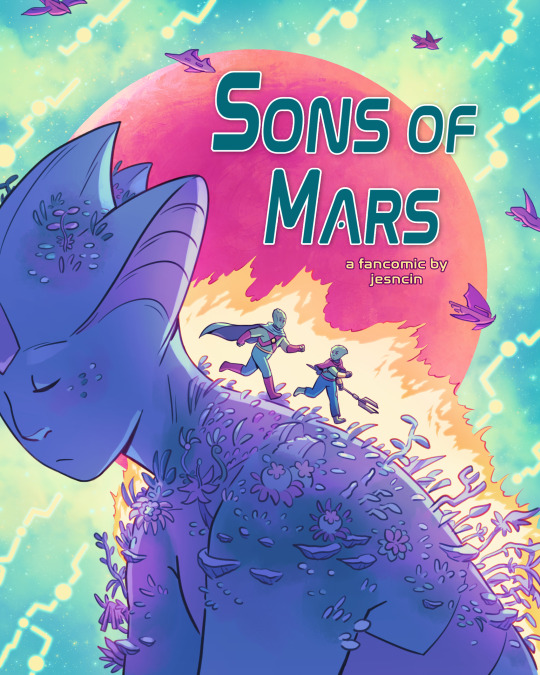
I put a lot of references into Sons of Mars and I thought it'd be fun to have a post detailing all the nods and research from the comics there are!
The title is a spin on the Martian Manhunter solo (written by John Ostrander and drawn by Tom Mandrake) collection title.


We pulled the idea of J'onn and Ma'al going on a pilgrimage as a form of revisiting their origin story from the first issue of the "Son of Mars" collection, Pilgrimage. This line is lifted more or less from the comic (we even wanted J'onn to be talking to Clark like he does in the source material).
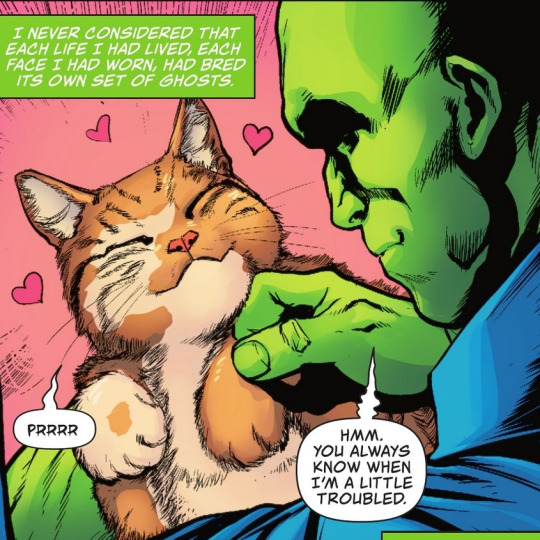
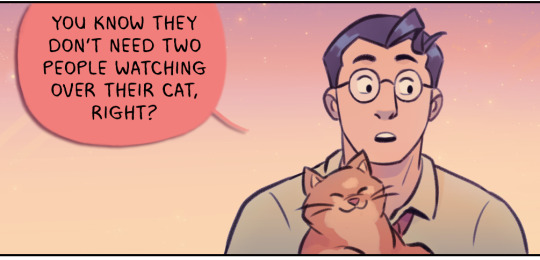
Double Stuff the cat is from Action Comics #1037 Martian Manhunter: A Face In The Crowd (written by Shawn Aldridge and art by Adrianna Melo)

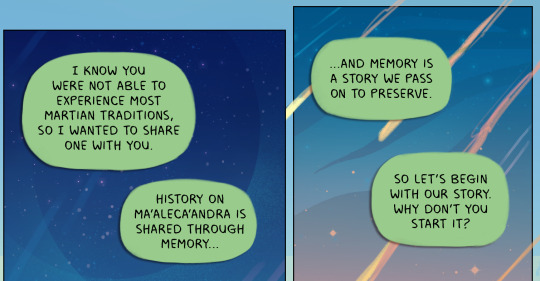
This line about memories being passed down as a form of history is from In my Life (pt 1) (written by Ostrander, drawn by Eduardo Barreto). We pulled most of J'onn and Ma'al's relationship from this comic, since it goes into a lot of detail about their origin.


The general look of Mars (from the martians to the environments) largely pull from Martian Manhunter 2019: Identity (written by Steve Orlando with art by Riley Rossmo). I really like that they clearly took their time to develop a unique visual language for Mars, especially the organic look of the buildings and the fun shapes of the spaceships. Rossmo does not get enough credit for creating such a fresh take on not only the environments but the martians as well! All the martians look unique and have different outfits, which we wanted to do as well!
Our only rule for the environment was that we didn't want any pyramids. Because ancient astronaut theory is racist garbo and I don't want it in my Martian worldbuilding!


This page with Sha'sheen and M'yrnn is a direct homage to their page from In my Life. Idk how it happened but the parents look very t4t in our version lol
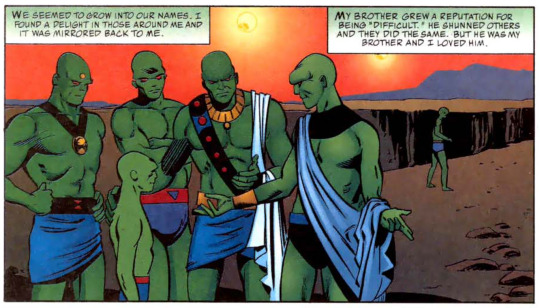

Another homage to In my Life. I wanted to imitate the color scheme and the martian outfits here too.

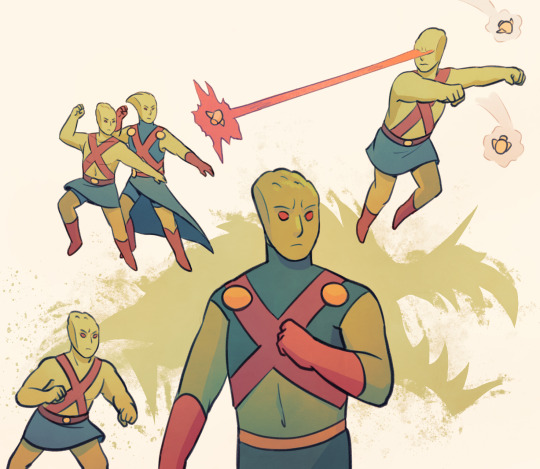
More In my Life homages! This time it's the manhunter training montage.

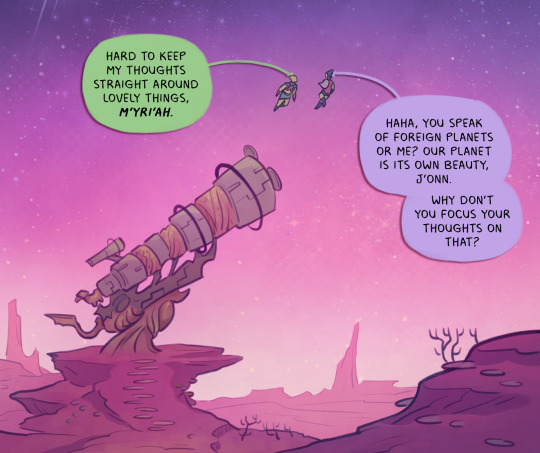
Telescope romance scene is from MM 2019: Identity! The color scheme and the vibes were already great, I didn't change much haha. M'yri'ah's characterization, J'onn geeking out about other planets, and J'onn's parents' disapproval of M'yri'ah as a partner are all from Identity. I really liked how that story fleshed her out as a character.

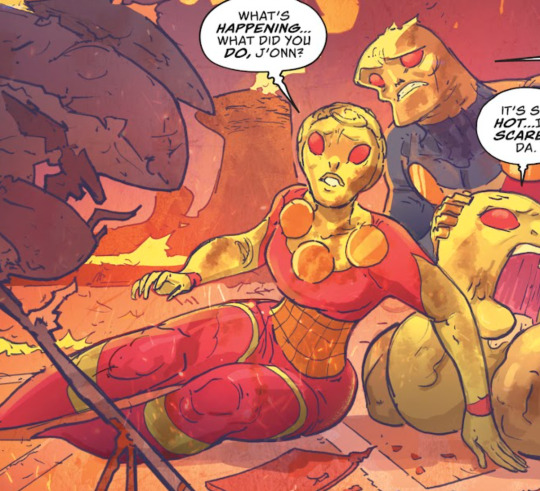

I also based M'yri'ah's design off of her Identity true and public forms. I went for less pixar-mom hourglass shape and more buff and built since she's a fighter in our version. We wanted her to be as much a renaissance man as J'onn is often depicted as.
M'yri'ah refers to Earth as Thu'ulc'andra and Mars is referred to as Ma'aleca'andra in our comic. This is a continuation of Ostrander referencing CS Lewis' Space Trilogy for how martians named other planets. However! In Ostrander's version he named earth Per'elandra, which is what Venus is referred to in the Space trilogy. This was later changed via community poll by Orlando for Identity.
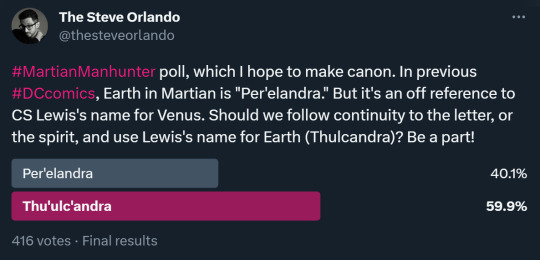
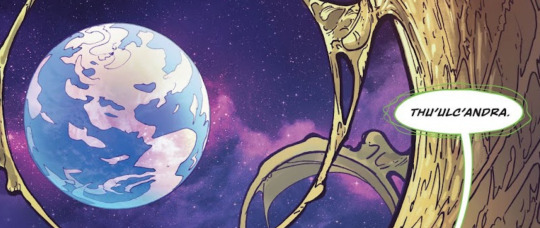

Kind of a homage to In my Life (pt3): Earthfall, but really I found an opportunity to continue the tradition of showcasing martian boinking that always happens in J'onn's origin story for some reason.
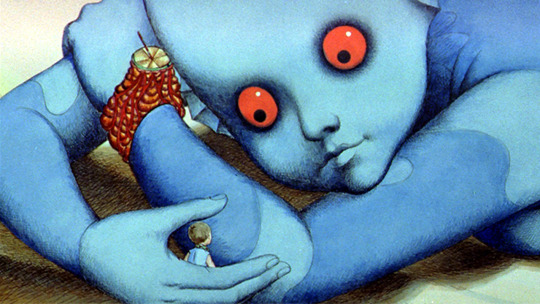
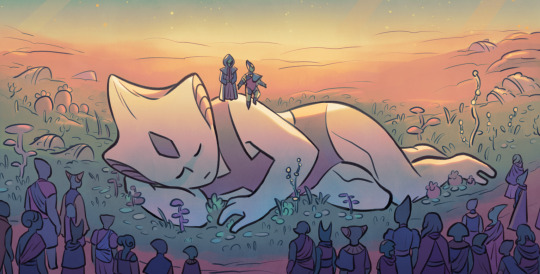
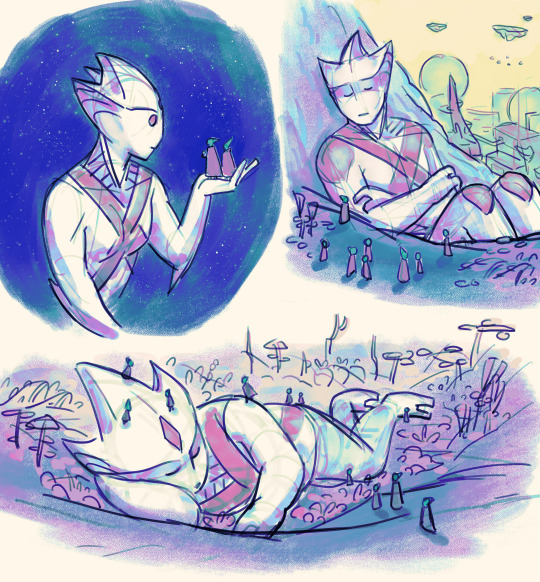
Not a Martian Manhunter reference, but more a new spin on White Martians. Inspired off of the Draag from the French film, Fantastic Planet. I love colossal set pieces~

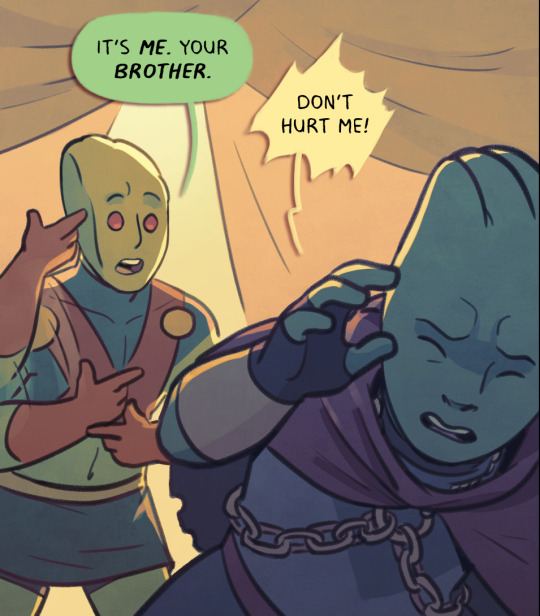
More In my Life parallels :>
That's all I can fit into one post for now! Pt 2 coming soon :)
Pt 1 | Pt 2 | Pt 3
#martian manhunter#sons of mars#dc comics#j'onn j'onzz#justice leauge#jlu#jl remix#ma'alefa'ak#ramblings#watch me geek out about martian comics
99 notes
·
View notes
Text
Discovering Spiritual Routes: Punjab's Chief Minister’s Pilgrimage Scheme Unveiled
Chandigarh, November 6, 2023: Punjab Government to start Chief Minister’s Pilgrimage Scheme, under which people of Punjab will be facilitated to travel to places of pilgrimage.
0 notes